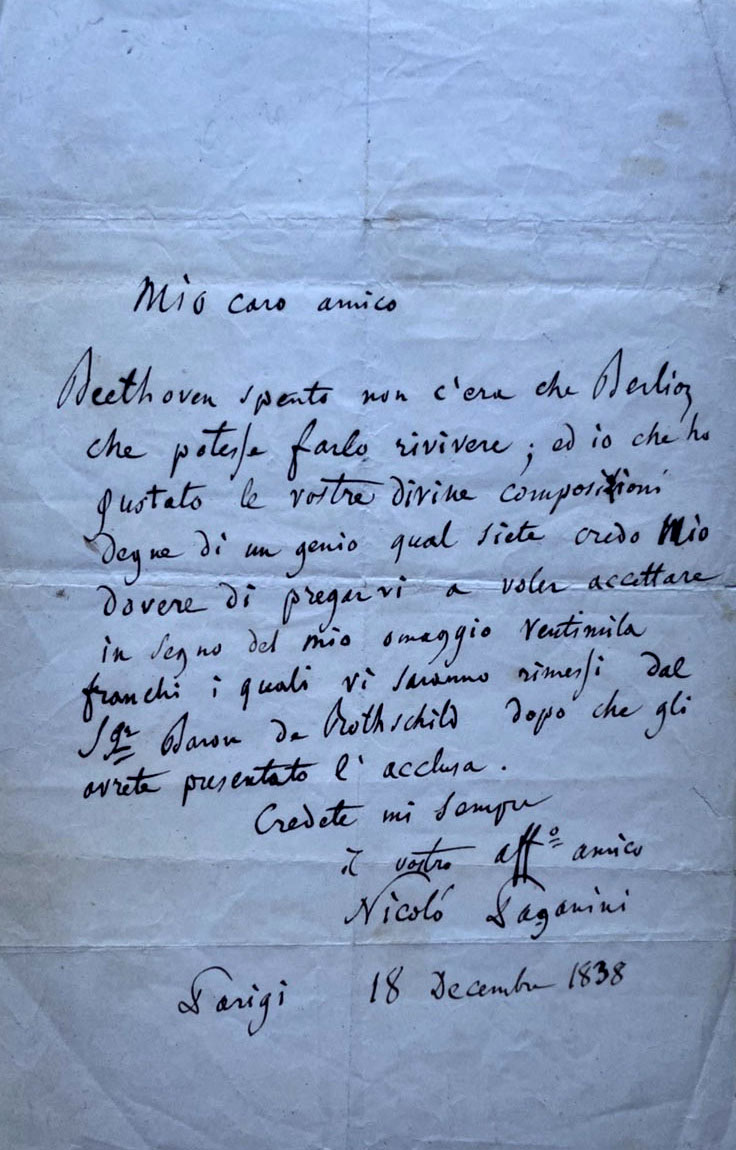This page is also available in French
The image reproduced on this page relates to one of the most celebrated incidents in Berlioz’s career. On 16 December 1838 Berlioz gave a concert at the Conservatoire which included the Symphonie fantastique and Harold en Italie. The latter symphony had been composed by Berlioz at the instigation of Paganini, but it was the first time that the great virtuoso heard it: he was so moved that after the concert he knelt before Berlioz in a gesture of public homage, and two days later sent a letter to Berlioz with a gift of 20,000 francs, which enabled him to clear his wife’s debts and go on to compose the symphony Roméo et Juliette. A detailed account of Berlioz’s relations with Paganini is given in the entry on Paganini in the Berlioz Photo Album.
The episode was related in detail later by Berlioz in his posthumous Mémoires (chapter 49), where Paganini’s letter is cited in full, though not quite accurately (an earlier version of this chapter had already appeared in Le Monde illustré on 4 June and 25 June 1859). But the event caused a sensation in Paris and abroad almost from the moment it happened. Possibly at Berlioz’s instigation, Paganini’s letter was reproduced in facsimile in the Revue et gazette musicale on 23 December 1838, together with a translation in French and Berlioz’s reply to Paganini (which Berlioz did not include in the Mémoires as he thought it inadequate). See CG nos. 600 and 601. There is a facsimile both of Paganini’s letter and of Berlioz’s reply to it in Adolphe Jullien’s Hector Berlioz, Sa vie et ses œuvres (1888), pp. 140 and 141. For an English translation of the letter see below.
The event was much commented upon by the press, at home and internationally, and was frequently mentioned thereafter. For example, the journal Le Siècle reproduced the French translation of Paganini’s letter on 30 December 1838. When Berlioz visited Vienna in 1845 the local paper Zuschauer published a biographical note on the composer, which gave prominence to Paganini’s gift (14 November 1845; Berlioz may well have supplied himself the information). An obituary of Berlioz in 1869 by Timothée Trimm concluded with a reference to Paganini’s generosity and quoted his letter to Berlioz in translation (Le Petit Journal, 10 March 1869).
Berlioz’s correspondence in the coming weeks naturally made numerous references to the event (see CG nos. 608, 612, 616, 617, 622). The day he received Paganini’s letter he wrote to his father in La Côte Saint-André, relating the story and transcribing the letter in Italian in full, except for the last line (CG no. 602, 18 December 1838). He presumably had Paganini’s original in front of him when he made the transcription (yet wrote incorrectly Beethoven estinto instead of Beethoven spento). In a footnote on this letter the editor of CG (Volume II, p. 490 n. 3) mentions a report that no less than three copies of the Paganini letter are in existence (this presumably refers to copies of the original by Berlioz rather than by Paganini). On the other hand Peter Bloom, in his edition of the Mémoires, only mentions one copy of the original by Berlioz, which is preserved in the Reboul collection (Mémoires d’Hector Berlioz de 1803 à 1865 [2019], p. 460 n. 8). The copy of the letter illustrated below, from a different private collection, does suggest that Berlioz did make more than one copy for his own use. A comparison of this text with the facsimile in Jullien’s 1888 book mentioned above shows that, apart from the omission of a few punctuation marks and of an article in the last line, Berlioz reproduced closely the original.

Translation of Paganini’s letter:
My dear friend
Beethoven dead there was no one but Berlioz who could bring him back to life; and I who have experienced your divine compositions worthy of a genius such as yours, believe it is my duty to beg you to be willing to accept as a sign of my homage 20,000 francs which will be handed over to you by the Baron of Rothschild on presentation of the enclosed note.
Believe me to be ever
your affectionate friend
Nicolo Paganini
Paris 18 December 1838
![]()
The Hector Berlioz Website was created on 18 June 1997 by Monir Tayeb and Michel Austin; this page created on 1 March 2021.
© Monir Tayeb and Michel Austin. All rights reserved.